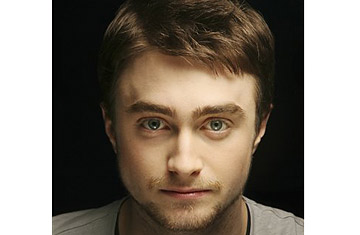
Daniel Radcliffe
Even for sophisticated New York theatergoers, there's nothing like a little onstage nudity to get the blood flowing. Even better, a little nudity involving perhaps the best-known child actor in the world. Daniel Radcliffe, who has played Harry Potter in five (going on six) hugely popular movies, made his stage debut last year in a London revival of Equus — Peter Shaffer's acclaimed 1973 play about a stable boy who, in an inexplicable act of violence, has blinded six horses with a metal spike. The big news, however, was not the first glimpse of Radcliffe's acting chops but of his private parts. Now the London production has come to Broadway, accompanied by the same sort of vaguely leering anticipation.
First things first: Yes, he's full frontal — and not in Hair-like dim light or just for a fleeting few seconds, in the manner of so many off-Broadway plays trying to demonstrate their avant-garde cojones these days. He's out there for several minutes, alongside a young actress (Anna Camp) equally on display, in a scene that, even 35 years later, is still pretty startling and (rare for the stage) actually erotic. The kid's a trouper.
But the real revelation from Equus, which has just opened at Broadway's Broadhurst Theatre, is that Radcliffe proves himself a strong, confident and convincing stage actor. As the troubled 17-year-old Alan Strang, he holds his compact, still-smallish body straight and still, his hands thrust down at his side — a polite, almost stolid youth who, as his story unfolds through the prodding of the psychiatrist tasked with finding the motivation for his horrific crime, is transported into religio-sexual ecstasy in the presence of his equine gods. In a Broadway season when neophytes from Katie Holmes to Cedric the Entertainer are making their stage debuts, Radcliffe transcends stunt casting. He holds his own nicely opposite Richard Griffiths, the portly, Tony-winning star of The History Boys, who makes the psychiatrist, Dr. Martin Dysart, an empathetic if less charismatic figure than some actors (Anthony Hopkins, Richard Burton) who have played the role before.
Does Equus hold up? It is not — never was — a great play, but it's a terrific piece of theater. On one level, it's a straightforward mystery, not whodunit but why; on another, a battle of wits between psychiatrist and patient. But it doesn't take long to ferret out Shaffer's sometimes overexplicit theme — that old chestnut about the "insane" being more authentically alive than those of us leading ordered, conformist, "normal" lives. "The boy has created out of his drab existence a passion more ferocious than any I have known in any second of my life," says Dr. Dysart. "That's what his stare has been saying to me all this time. 'At least I galloped!' "
It's the galloping that helps Equus rise above its didactic moments. The play's conceit is to have actors playing the horses —wearing wire masks and rising majestically on similarly constructed hoof-like platform shoes. The dance-like performances (under Thea Sharrock's solid, no-nonsense direction) are both realistic and exotic, evoking the otherworldly power of the boy's obsession. The play's glibness melts before its arresting images; the climactic re-creation of the crime is a stunning coup-de-theater. This Equus is not a bad graduation present for Harry Potter — or for his grown-up audiences.
